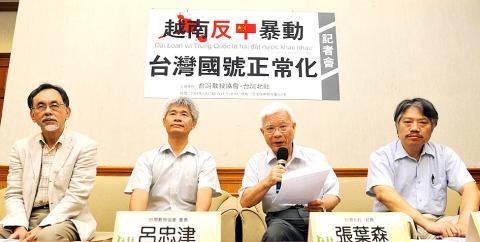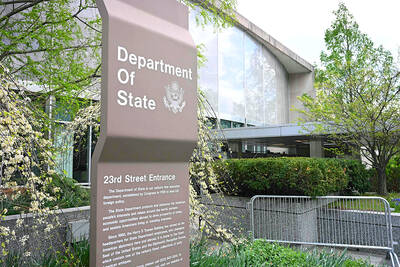Former representative to Japan Koh Se-kai (許世楷) and former minister of foreign affairs Mark Chen (陳唐山) yesterday denounced President Ma Ying-jeou’s (馬英九) “one China” policy as the reason Taiwanese businesses are targeted in the anti-China violence in Vietnam.
The “one China” policy, which has Vietnamese mistakenly consider Taiwan as part of China, is what puts Taiwanese businesses operating in Vietnam at risk during anti-China riots, Chen said.
Chen said that, since the 90,000 Vietnamese migrant spouses in Taiwan clearly understand that Taiwan and China are different countries, the Ministry of the Interior should encourage them to exert their influence and to help convey the message that Taiwan is different from China back to Vietnam and that Taiwanese should not punished for problems caused by China

Photo: George Tsorng, Taipei Times
Koh said that since the Ma administration has always been under the sway of China, Ma is unable to quickly react to the Vietnam violence, with the government’s countermeasures all similar to stalling strategies.
He added that he is afraid that the nation is to be lumped together with China when future negotiations about compensation for Taiwanese businesses takes place.
“It would be difficult to have compensation straightened out if we were tied with China,” Koh said.
Chen and Koh made the remarks on the sidelines of a conference in Taipei on Taiwan’s future hosted by the Taiwan New Century Foundation in commemoration of late Democratic Progressive Party lawmaker Chai Trong-rong (蔡同榮).
Former foreign ministry official Maysing Yang (楊黃美幸) also said the “one China” policy generated various problems in the international community.
If the government maintained a firm position on differentiating between Taiwan and China, Taiwanese businesses overseas would not have suffered from anti-China violence, she said.
Chen said that the Ma administration has never seriously refuted the claim that China has been repeatedly making about Taiwan’s being a part of China.
This connivance on the government’s part is responsible for the Vietnamese mistaking Taiwan as part of China, so the government is to blame for losses Taiwanese businesses are suffering in Vietnam, he added.
Koh criticized Ma’s “one China” policy as the cause of the international misunderstanding, adding that he always made clear to the Japanese government that Taiwan is an independent country when he was a representative to Japan.
Meanwhile, in related news, a pro-localization group yesterday urged the government to rectify Taiwan’s name after the attacks in the recent Vietnamese demonstrations.
“Foreign nationals easily confused the Republic of China (ROC) with ‘People’s Republic of China,’” Taiwan Association of University Professors president Lu Chung-chin (呂忠津) told a press conference in Taipei.
Citing Taiwanese accounts that the Vietnamese rioters made no distinction between Chinese and Taiwanese because most of the rioters said “Taiwan is part of China,” Lu said the incident shows the nation must quickly rectify its name to “let the international community know that Taiwan and China are two different countries.”
He added that Vietnamese textbooks teach that Taiwan is part of China, “however, regretfully, we did not see the Ministry of Foreign Affairs protest and ask Hanoi to correct the error.”
He said the ministry should hold an international press conference immediately to make clear that Taiwan and China are two different countries and therefore help assure Taiwanese businesspeople’s safety and interests in Vietnam.
Additional reporting by Rich Chang

Hong Kong singer Eason Chan’s (陳奕迅) concerts in Kaohsiung this weekend have been postponed after he was diagnosed with Covid-19 this morning, the organizer said today. Chan’s “FEAR and DREAMS” concert which was scheduled to be held in the coming three days at the Kaohsiung Arena would be rescheduled to May 29, 30 and 31, while the three shows scheduled over the next weekend, from May 23 to 25, would be held as usual, Universal Music said in a statement. Ticket holders can apply for a full refund or attend the postponed concerts with the same seating, the organizer said. Refund arrangements would

Former president Tsai Ing-wen (蔡英文) on Monday called for greater cooperation between Taiwan, Lithuania and the EU to counter threats to information security, including attacks on undersea cables and other critical infrastructure. In a speech at Vilnius University in the Lithuanian capital, Tsai highlighted recent incidents in which vital undersea cables — essential for cross-border data transmission — were severed in the Taiwan Strait and the Baltic Sea over the past year. Taiwanese authorities suspect Chinese sabotage in the incidents near Taiwan’s waters, while EU leaders have said Russia is the likely culprit behind similar breaches in the Baltic. “Taiwan and our European

Taiwanese indie band Sunset Rollercoaster and South Korean outfit Hyukoh collectively received the most nominations at this year’s Golden Melody Awards, earning a total of seven nods from the jury on Wednesday. The bands collaborated on their 2024 album AAA, which received nominations for best band, best album producer, best album design and best vocal album recording. “Young Man,” a single from the album, earned nominations for song of the year and best music video, while another track, “Antenna,” also received a best music video nomination. Late Hong Kong-American singer Khalil Fong (方大同) was named the jury award winner for his 2024 album

The US Department of State on Monday reaffirmed that US policy on Taiwan remains unchanged, following US President Donald Trump’s use of the term “unification” while commenting on recent trade talks with China. Speaking at a wide-ranging press conference, Trump described what he viewed as progress in trade negotiations with China held in Geneva, Switzerland, over the weekend. “They’ve agreed to open China — fully open China, and I think it’s going to be fantastic for China. I think it’s going to be fantastic for us,” Trump said. “I think it’s going to be great for unification and peace.” Trump’s use of the